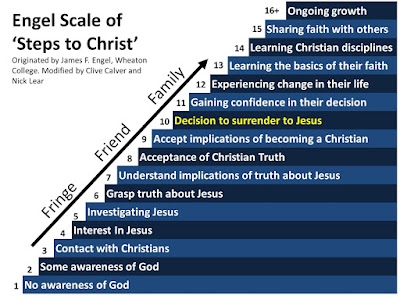A truly awkward question
This is, as you see, the Engel scale, which tries to explain and gauge individual progress on the spiritual journey. Looking at it this morning I asked myself whether the same scale might apply to churches as well as individuals. I sometimes think of alarming questions, and this one alarmed me very much. What if there are church congregations that are nominally Christian, but in their preaching and teaching, and in the understanding possessed by the members, fall somewhere below ten on the scale?
If there are some churches that are pre-Christian on this scale, but calling themselves fully Christian, then that has big implications for church unity. How can we unify with a church that is something other than what we ourselves mean when we say "Christian"? For it is clear that we and they would mean different things by it, if we are above and they are below step ten.
In the hypothetical pre-Christian churches I am talking about, disciple making would be absent, or at best a mockery of the real thing. The churches might be very religious, and even very strict, but real growth as a Christian requires something besides zeal. You need the spiritual connection that comes with surrender, the heavenly moment when you stop explaining to God what you think.
Or pre-Christian churches may be morally lax, preaching a message of easy cheap grace, of forgiveness without repentance, of God's favor without his guidance. This too is unsurrendered living, just of a different kind. Whether the church is strict and legalistic or easygoing and antinomian depends on the tastes of the audience it seeks and attracts.
I think it is true: Some congregations and institutions now identifying themselves as Christian churches do not rise high enough on the Engel scale to justify that title. That explains a lot of what you see when you look at the church world and see disorder and divergent claims and counter-blasts about doctrinal distinctives that have little to do with the gospel, at all. The impression I get is of numerous churches that are more talk than action. They are good at explaining their take on Christianity but they are unfruitful when it comes to producing well formed disciples.
How pervasive is this problem? That is difficult to pin down, but there are clear indicators that the problem exists. Cults of the obviously heretical kind get sidetracked somewhere before step six, thus preach another gospel and a Jesus who bears little resemblance to the real one. Other, more mainstream efforts may stall at or below step nine, turning into pharisaical show-Christians. They have accepted some implications of Christianity thoroughly enough that they feel they ought to fake them, whether with legalistic sternness or antinomian elaborate explanations.
I hope I am all wrong about this, for the line of thought here is distinctly disturbing, but it appears to me that the Engel scale has implications beyond evangelism and individual discipleship, and gives us a lens to look at the church world. If what the scale says is true for individuals, why would it not be true for individuals in the aggregate, that is to say, congregated?

Comments
Post a Comment